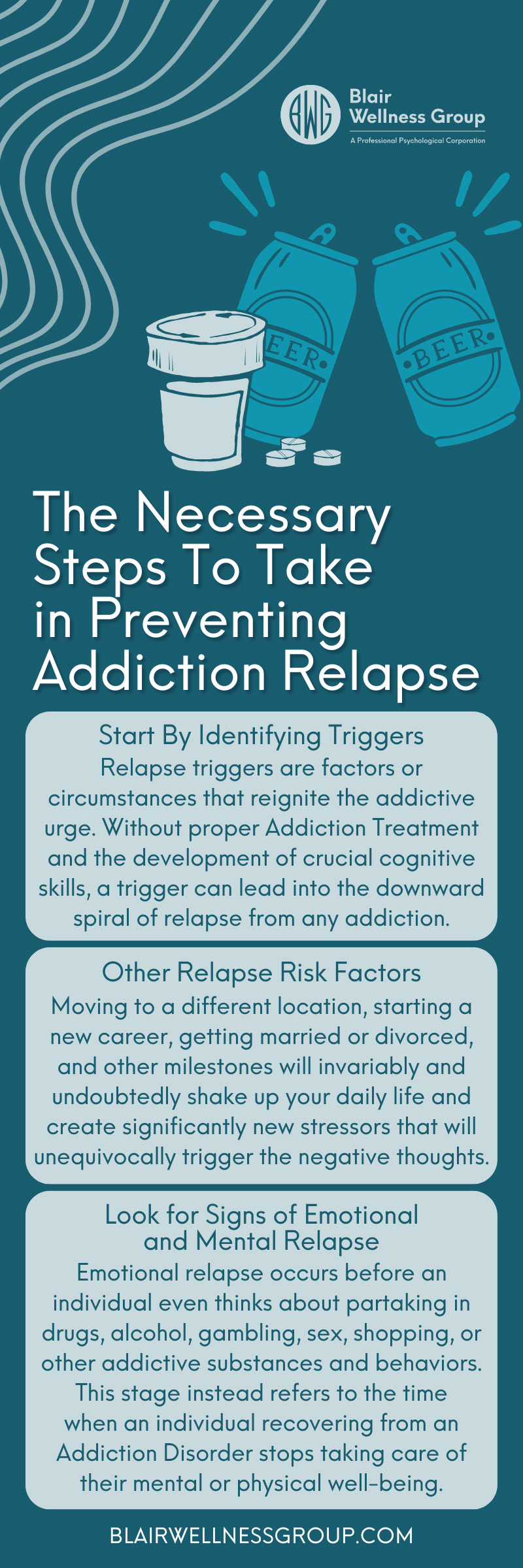Recovering from an Addiction Disorder is far from straightforward. There are many ups and downs on the journey, including the potential for relapse. Relapse triggers, comorbid Mental Health Disorders, and other factors make relapse more likely and pose a risk for your Mental Health treatment. However, understanding these risks and working closely with a Licensed Clinical Psychologist who has vast experience, formal training, clinical knowledge, offering long-term, evidence-based Addiction Disorder treatment can help you seek necessary interventions, avoid relapse, and preserve your psychological, physical, emotional, and mental well-being.
Learn more about where addiction relapse comes from and what the risk factors are with this guide to the necessary steps to take in preventing addiction relapse.
What Is Relapse?
The simple definition of relapse is partaking in addictive substances or behaviors after a period of recovery. However, the reality is much more complex than this. Many people view relapse as a sudden and extreme downfall, but the truth is that relapse is a process. Someone who is recovering from an addiction can relapse because they have a glass of champagne on a special occasion. In fact, one drink might be the wrong step toward the return of consistent alcohol abuse.
Complete relapse occurs when you start consistently abusing alcohol, substance, gambling, sex, porn, drugs, or partaking in other similar addictive behaviors again. However, just like Addiction Disorders do not develop suddenly, relapse does not occur all at once. It is a process, and recognizing how one gets to the point of relapse allows you to identify warning signs and seek intervention from a Licensed Clinical Psychologist.
Start By Identifying Triggers
Triggers and relapse go hand in hand. Relapse triggers are factors or circumstances that reignite the addictive urge. Without proper Addiction Treatment and the development of crucial cognitive skills—such as stress management, modulating your affect, mindfulness, mentalization, anger management, and emotional regulation—through the expertise of a Licensed Clinical Psychologist, a trigger can lead into the downward spiral of relapse from any addiction, including addiction to codependency, drama, or chaos.
Relapse triggers can happen at any time, and they can stem from a wide variety of sources and scenarios. It is also important to note that relapse triggers can be both internal and external. Internal triggers stem from inner dialogue, compulsions, ruminating thoughts, and overwhelming emotions. Without crucial clinical interventions, including mentalization, Schema-Focused Therapy, Dialectical Behavioral Therapy, Cognitive Behavioral Therapy, interpersonal effectiveness, and other evidence-based models, negative feelings such as dread, guilt, anger, shame, or fear increase the urge to turn to maladaptive behaviors.
External triggers stem from some event or interaction that becomes the precipitating factor in your life, reminding you to revert back to your subconscious and primitive defense mechanisms. This can cause relapse and put you back in the physical, mental, or emotional setting of your Addiction Disorders. Below are a few examples of external triggers.
People as Triggers
The people around you can act as relapse triggers. A common example of this is when someone who is recovering from Addiction Disorders still spends time with friends or family members who struggle with the same disorders or are codependent on the shortcomings of the person struggling with addiction. These relationships can keep you in an environment where you have access and even encourage you to partake in the addictive substance or addictive behaviors, such as shopping, traveling, gambling, sex, porn, gaming, social media, and partying.
However, this is far from the only example of how people can trigger relapse. Anyone who invokes feelings, thoughts, and reminders of your weaknesses, inadequacies, fears, phobias, pain, emptiness, inner void, traumatic experiences, and childhood struggles can instantaneously trigger you during recovery.
Places as Triggers
Places are another common external relapse trigger. Some of these are straightforward. If you are recovering from Alcohol Addiction or Substance Abuse Addiction, then spending time in a bar, traveling, partying, or other similar addictive behaviors can affect your chances of relapsing immediately. That said, any location can be a relapse trigger if it brings up painful thoughts, emotions, or traumatic memories regarding your Addiction Disorder.
Access as a Trigger
When you have easy access to addictive substances or behaviors, you are more likely to partake in those activities with people who are codependent on your maladaptive behaviors. When your addiction is within reach, there are fewer barriers to remind you how important recovery is and why you want to resist your cravings.
This is why, in addition to seeking professional Mental Health treatment from a Licensed Clinical Psychologist who specializes in Addiction Disorders, it is important to limit access to any addictive behaviors, substances, or codependent relationships. For example, if you are recovering from a Substance Abuse Disorder, avoid interaction with dealers, friends, and family members who encourage your codependency and are not actively promoting and supporting your recovery.
Other Relapse Risk Factors
Other factors, such as stressful life changes and comorbid Mental Health Disorders, can also increase your chance of relapse.
Major life events can trigger a relapse, even if those changes are positive. Moving to a different location, starting a new career, getting married or divorced, getting pregnant, traveling for work or pleasure, and other milestones will invariably and undoubtedly shake up your daily life, disrupt routines, upset your new adaptive patterns, and create significantly new stressors that will unequivocally trigger the negative thoughts, overwhelming emotions, maladaptive defense mechanisms, and therefore reignite your Addiction Disorders.
Comorbid Mental Health Disorders are also common risk factors for relapse. Depressive Disorders, Anxiety Disorders, Personality Disorders, PTSD, Attachment Disorders, and other Mental Health Conditions create overwhelming stressors and negative emotions, which increase the urge to run to codependent relationships, addictive substances, or behaviors.
Look for Signs of Emotional and Mental Relapse
Relapse, like recovery, comes in stages. It involves more than simply participating in addictive behaviors or substance abuse again. In fact, in most scenarios, relapse starts long before the decision to consume alcohol or drugs or participate in an addictive behavior again.
This is why it is crucial to understand the initial stages of relapse—including emotional, psychological, and mental relapse. Doing so allows you to detect early warning signs and seek interference and treatment from a skilled and knowledgeable Clinical Psychologist when it’s necessary.
Emotional Relapse
Emotional relapse occurs before an individual even thinks about partaking in codependent relationships, traveling, gambling, sex, shopping, social media, gaming, drugs, alcohol, or other addictive substances and behaviors. This stage refers to the time when an individual recovering from an Addiction Disorder becomes complacent by not taking daily steps systematically and methodically or not engaging fully in their recovery. They may start taking their treatment for granted or develop a superficial sense of well-being, which falsely makes them believe that they do not need to take intensive interventions seriously.
Emotional relapse puts you in the position where traveling, shopping, social media, gambling, gaming, drinking, doing drugs, or participating in your addictive behavior seems increasingly desirable to avoid going to the depths of your inner void, emptiness, or the unresolved traumas of your life. Without necessary and intensive interventions provided under the care of a skilled Clinical Psychologist, it is very likely that you will experience emotional relapse and turning to your addiction behaviors and/or substance as a dangerous way to avoid overwhelming and negative emotions.
Mental Relapse
Mental relapse is the natural development of emotional relapse. In the midst of these negative feelings, the individual will experience intrusive thoughts and compulsions about their addictive behaviors or substances. Mental relapse involves an internal struggle or cognitive dissonance as your desire to remain in recovery battles with these increasingly intense impulses to escape painful realities of life and avoid dealing with them constructively, adaptively, clinically, and methodically. Many people start bargaining with themselves, trying to convince themselves that they can be in control if they partake in their addictive behaviors again. Without intensive, intentional, systematic, methodical interventions guided by a seasoned Clinical Psychologist who is well-versed in addiction treatment, these thoughts can lead to mental, emotional, psychological, physical relapse or by partaking in traveling, social media, gaming, porn, sex, shopping sprees, drugs, alcohol, gambling, and other addictive behaviors or substances.
Professional Treatment Is Key To Preventing Relapse
Undergoing treatment under the care of a skilled, knowledgeable, and well-versed Clinical Psychologist who specializes in Addiction Disorders and Substance Abuse Disorders, is a necessary step to take in preventing any relapse or minimize the intensity of any potential relapse during recovery. An experienced Addiction Psychologist has the knowledge and expertise to deliver a comprehensive, evidence-based treatment plan. Find your path to recovery when you pursue treatment at Blair Wellness Group today.

Dr. Cassidy Blair is a renowned Licensed Clinical Psychologist and trusted Performance Coach who specializes in providing Concierge-Psychological Care and Executive Coaching for high-achieving professionals. With a deep understanding of the unique challenges faced by CEOs, executives, entrepreneurs, and leaders, Dr. Blair offers tailored, confidential care designed to foster emotional well-being, personal growth, and professional excellence. Her clientele values her discretion, clinical expertise, and emotionally intelligent approach to navigating complex personal and professional dynamics.
- This author does not have any more posts.




